(New York) - The Bangladeshi military, deployed on December 9 to “ensure security” in the run-up to national elections, must avoid partisan sympathies and respect human rights, Human Rights Watch said today.
President Iajuddin Ahmed ordered the deployment late on Saturday, December 9, after weeks of sometimes violent protests prior to elections due in January. He said the deployment was necessary to “ensure security of countrymen and to create a congenial and peaceful atmosphere ahead of polls.”
On December 10, forces of the army, navy and air force deployed throughout Bangladesh. The police banned gatherings around the presidential palace in Dhaka.
“Past experience with Bangladeshi leaders deploying the military gives us serious cause for concern,” said Brad Adams, Asia director of Human Rights Watch. “During the last major deployment, in 2002, more than 50 people died after being arrested by troops.”
National elections are slated for January 23. Bangladesh is currently governed by a caretaker administration run by President Ahmed, who also holds the portfolios of defense and home affairs.
A 14-party opposition coalition has staged regular demonstrations in recent weeks calling for electoral reform amid charges of bias by the caretaker government and large-scale voter registration fraud. More than 40 people have died and scores have been injured in pre-election protests.
On December 11, four cabinet members of the caretaker government resigned to protest the military deployment. One of them, human rights lawyer Sultana Kamal, said the entire cabinet had objected the move. “But he [the president] did not care,” she told reporters. “The deployment of the army is against the democratic process ... it can provoke the political parties and create obstacles to holding a free and fair election.”
The military has played a powerful role in Bangladesh since the country gained independence from Pakistan in 1971. Two presidents have lost their lives in military coups.
The last large-scale military deployment occurred in October 2002, when the government ordered more than 40,000 military personnel to fight spiraling crime in “Operation Clean Heart,” which lasted 85 days. During that time, the army arrested more than 10,000 people, at least 50 of whom died in custody, in unclear circumstances. Officials attributed most of those deaths to “heart attacks.”
Just before the operation ended in January 2003, parliament passed legislation to ensure that no member of the armed forces could face prosecution for abuses during the campaign. The Joint Drive Indemnity Ordinance of 2003 granted immunity from prosecution to armed forces and government officials for their involvement in “any casualty, damage to life and property, violation of rights, physical or mental damage” between October 16, 2002, and January 9, 2003.
To date, no military personnel are known to have been held criminally responsible for any of the 50 or more custodial deaths.
“Abusive members of the military have enjoyed near-total immunity for their violent crimes in the past,” Adams said. “If the military is to promote law and order today, it must respect the law.”
The military deployment comes much earlier than in past electoral cycles, 44 days before the election is scheduled, compared to 13 days in 2001, 18 days in 1996, and 23 days before the 1991 vote.
Human Rights Watch said it was concerned about the early deployment, given the experience with “Clean Heart” and the fact that the army’s powers remain unclear. Newspapers have reported that the army will have the power of arrest, but the government has not clarified this point.
“Given the military’s record of human rights violations, it’s crucial that the army follow strict rules limiting the use of force,” said Adams. “The army is not trained in policing, and history shows that it abuses people’s rights when asked to work as police.”
Human Rights Watch said the deployment should be seen in the context of violence and extrajudicial killings by Bangladesh’s security forces. Over the past three years, more than 350 people have died in the custody of the police and the Rapid Action Battalion (RAB), an elite paramilitary anti-crime and anti-terrorism force. Many deaths resulted from extrajudicial executions. Torture is common and often goes unpunished.






